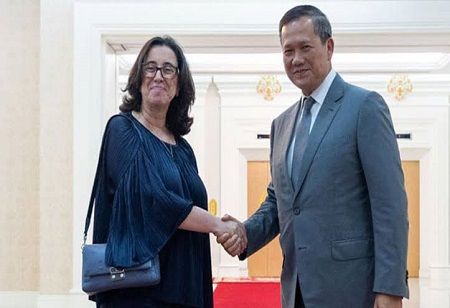- World Bank pledges continued support to Cambodia’s education sector, focusing on enrollment, teacher training, and curriculum reforms.
- Plans include boosting AI and STEM education, tracking systems for student-teacher performance, and expanding early childhood programs.
- Top officials highlight shared vision for inclusive, tech-driven education to build strong human capital for Cambodia’s future.
The World Bank will see Cambodia's education sector through various mechanisms and projects. World Bank East Asia and Pacific Vice-President Manuela Ferro made this at a Monday meeting with Education, Youth and Sport Minister Hang Chuon Naron at the Ministry.
The meeting intended to discuss additional collaboration between the Ministry and the World Bank, especially in the execution of the major education projects that will enhance the level of education, students' enrollment, and teachers' training in Cambodia. The meeting also provided a chance to introduce the upcoming plans for the enhancement of the education sector so that every Cambodian citizen has access to quality and equitable education to meet industry needs.
Ferro applauded the Ministry on its success in building up the education sector over the years, noting the tremendous progress, especially in teaching and learning quality, access to education, and curriculum reform to respond to the labour market requirements.
In an era of fast development today, it is critical that children and youngsters learn new knowledge, particularly artificial intelligence (AI) knowledge, she added. The World Bank is prepared to maintain its support to Cambodia through its strategic plans and other projects to further enhance the effectiveness of the education sector in the country, she said.
Naron has stated education is a top priority for the Cambodian government to construct quality human capital for national socio-economic development. He further stated that the Ministry is still carrying out an overall education reform plan aiming to enhance the strength of teachers' quality, cultivate digital and high-tech skills, including AI, enhance the education of science, technology, engineering, and mathematics, use technology to track students' attendance and teachers' performance, improve the quality of early childhood education, and offer professional training and development.
He added that these initiatives are making sure Cambodian children and youth are endowed with the ability and skills to compete with their peers in national and international work forces.
Naron expressed gratitude to the World Bank for its continuous support to Cambodia's education sector. The support had made a major contribution to the growth of education in Cambodia, he added.
"We are still very optimistic that this very good collaboration will become even stronger in the future to develop our common vision of an inclusive, high-quality, and enabling education system for all Cambodians", he added.
Ferro also had a meeting with Prime Minister Hun Manet on Monday at Peace Palace. She added that the World Bank is still dedicated to its long-term cooperation with Cambodia in main areas, such as education, health, and agriculture.
Mr Hun Manet confirmed that the government is still focused on developing human capital through better education from primary to secondary school and launching career-based technical training programs.

